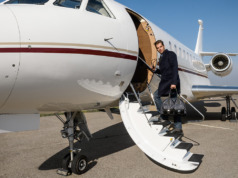
On February 14th, as relationships are celebrated in many parts of the world, the U.S. Department of Transportation (DOT) will place its new Air Charter Broker regulations into effect, thus formally establishing new relationships among the DOT, brokers, operators, and charterers. What do these new regulations codify?
Now air charter brokers must disclose whether they work for the charterer (as agent of the customer) finding and arranging flights, and/or for the operator (as agent of the operator) looking for customers for his or her client.
While brokers had been acting as principals without any federal regulatory authorization or legal standing to do so, the new rule provides them with protection to earn commissions for services performed. In effect, the DOT wrote this rule around existing industry business realities.
In addition to correcting and redefining this new status, in each transaction, three facts must be disclosed to the charter customer: the name of the operator conducting the flight, the role of the broker (is he or she an agent of the customer or of the operator?), and the amount of any liability insurance that the broker provides over and above the charter operators’ own insurance. Since a big part of the DOT’s job is to protect and provide information to the public, requiring these disclosures is not a surprise.
The air charter broker also must disclose three more pieces of information at the request of the charterer: the total price of the flight, any business relationship with the operator, and any additional fees, if known (such as for landing, deicing, or catering).
Of those six items, the requirement to disclose the name of the operator (and, according to the rule, “any other names in which the direct air carrier holds itself out to the public,” i.e. DBAs) is going to change the business environment dramatically.
Historically, most air charter brokers have preferred to not provide the name of the operator to their clients. While a good broker will not obfuscate it, many would rather not offer their potential client the ability to go directly to the operator, bypassing his or her services.
New brokers soon learn that they’re less likely to lose the client when they’re adding value to the transaction. Yes, the client will know who is flying them (and frankly, he or she should), but since the broker did all the legwork, sourced the lift, perhaps arranged catering and ground transportation, and/or booked multiple legs using multiple carriers, as well as, it is hoped, conducted due diligence on all elements of the trip, he or she well deserves the commission. Such thorough work provides high-quality service to the charterer, and a good client will want to stay with a good broker.
But what about those brokers who operate with just a cell phone and a website? Those who are just grabbing their percentage and then playing hard to get on the phone when something goes wrong? The new DOT rules will encourage them to make better business decisions, or perhaps to seek gainful employment elsewhere.
So, who will have a happy Valentine’s Day this year? Reputable brokers who conduct business on behalf of their clients safely, cost effectively, and with full transparency. The “barstool brokers” will have a much rougher time of it, since they now must compete on a level playing field, or face enforcement actions from the DOT, which can include fines and the option to require full refunds for mishandled charter trips. These shady brokers will be under very close observation, not only from their competitors, but by operators and charterers as well.
These new regulations will allow reputable brokers to continue to thrive, while eliminating the others. And that will make this a sweeter – and safer – Valentine’s Day indeed. BAA
Director, Charter Evaluation and Qualification at ARGUS International, has more than 20 years’ experience in operations, safety management, auditing, and brokering. A graduate of Embry-Riddle Aeronautical University, he is a commercial/multi-engine pilot.




